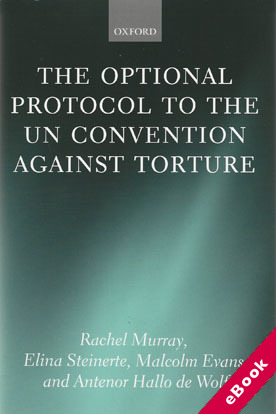
The device(s) you use to access the eBook content must be authorized with an Adobe ID before you download the product otherwise it will fail to register correctly.
For further information see https://www.wildy.com/ebook-formats
Once the order is confirmed an automated e-mail will be sent to you to allow you to download the eBook.
All eBooks are supplied firm sale and cannot be returned. If you believe there is a fault with your eBook then contact us on ebooks@wildy.com and we will help in resolving the issue. This does not affect your statutory rights.
The Optional Protocol to the UN Convention Against Torture (OPCAT) establishes an independent international monitoring committee (SPT) which itself will visit states and places where persons are deprived of their liberty.
It also requires states to set up independent national bodies to visit places of detention. This book, drawing upon events held and interviews with governments, civil society, members of UN treaty bodies, national visiting bodies and others, identifies key factors that have shaped the operation of these visiting bodies since OPCAT came into force in 2006.
It looks in detail at the background to the adoption of the Protocol, as well as how the international committee, the SPT, has carried out its mandate in its first few years. It examines the range of places of detention that could be visited by these bodies, and the expectations placed on the national visiting bodies themselves.